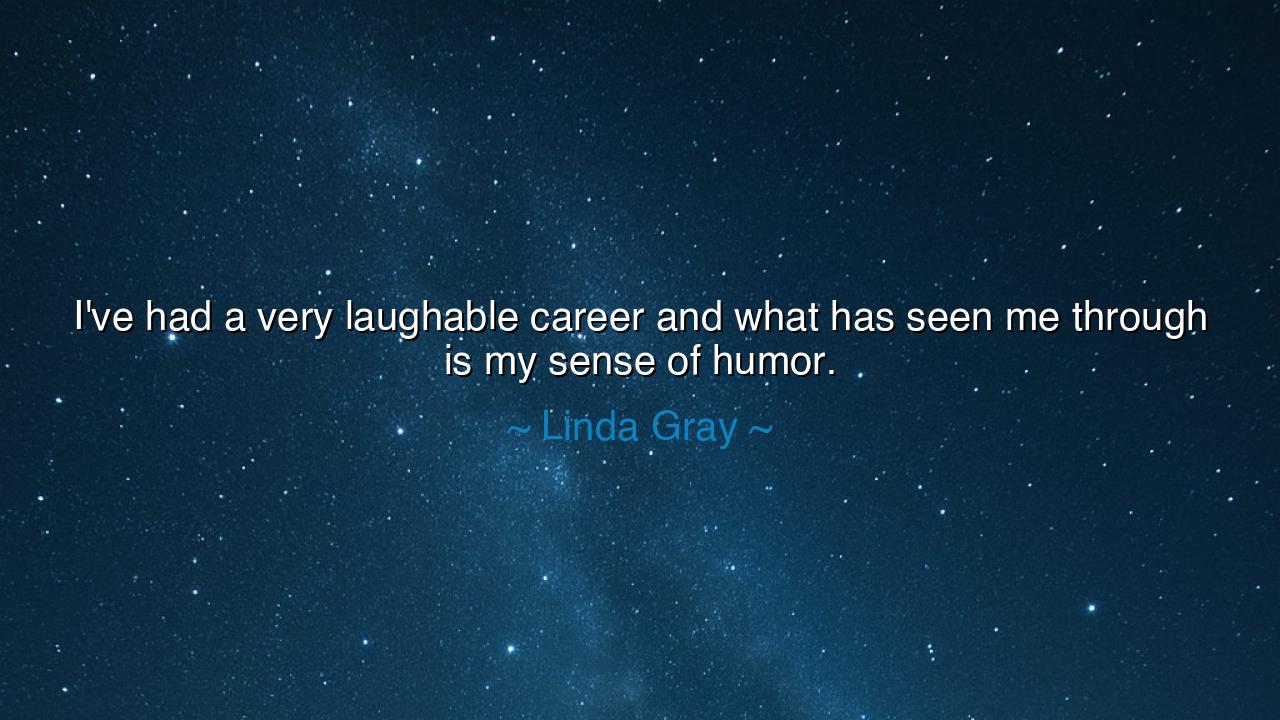
I've had a very laughable career and what has seen me through is






The words of Linda Gray—“I’ve had a very laughable career, and what has seen me through is my sense of humor”—carry the wisdom of a soul tested by time, yet softened by grace. Beneath their lighthearted phrasing lies a profound truth about the endurance of the human spirit. In her voice, we hear not self-pity but triumph, not mockery but mastery. She speaks as one who has known both the glitter of success and the sting of failure, yet has chosen laughter over bitterness, humor over despair. It is a testament to the oldest and noblest of strengths—the ability to smile through adversity and to find joy, even in folly.
When Gray calls her career “laughable,” she does not mean it in shame, but in humility. It is the humility of one who recognizes that the path of every artist, every seeker, is filled with both glory and absurdity. To stand before the world is to risk ridicule; to create is to expose one’s heart to the unpredictable winds of fate. Yet, she shows us that those who walk this road armed with a sense of humor do not crumble beneath its trials—they rise above them, light-footed and unbroken. Humor becomes a shield against cynicism, a torch that keeps the spirit warm when the world turns cold.
In this way, Gray’s wisdom belongs not only to the stage and screen but to all of life. For every human journey, however noble or ordinary, is marked by imperfection. We stumble, we err, we fall short of our imagined greatness. Those who take themselves too seriously become prisoners of pride; but those who can laugh at themselves gain freedom. The ancient Stoics knew this truth well. Epictetus, once a slave, taught that what matters is not what befalls us, but how we interpret it. He, too, understood humor as a form of divine perspective—the ability to see one’s troubles not as catastrophes, but as curious stories written by the hand of life.
Consider the story of Abraham Lincoln, who led a nation through its darkest hour. His presidency was marked by unbearable strain, yet those who knew him recalled his humor most of all. Once, accused of being two-faced, he smiled and said, “If I had another face, would I be wearing this one?” Through humor, he dissolved tension, bridged division, and reminded others of their shared humanity. Like Gray, Lincoln discovered that laughter is not frivolous—it is the voice of strength. It does not deny pain; it redeems it.
The origin of Gray’s reflection lies in the heart of an artist’s pilgrimage. The world of fame is fickle—one day it crowns, the next it forgets. Those who survive it without bitterness are those who find sustenance not in applause, but in laughter. For laughter, unlike glory, is eternal. It restores the balance between illusion and truth. Gray’s “laughable career” is not a confession of defeat, but a declaration of victory over vanity. She has learned, as the wise always do, that life’s comedy and tragedy are twins—and that to endure both with grace is the highest form of art.
Her words also whisper a deeper lesson about resilience. When we face rejection, humiliation, or failure, our instinct is to harden the heart. But humor softens it again. It teaches us to bend without breaking, to endure without bitterness. In laughter, we rediscover proportion—the reminder that we are small but still radiant, imperfect but still divine. A person who can laugh at their own missteps walks with the strength of ten solemn men, for they have made peace with imperfection.
Let this, then, be the teaching passed down: Hold fast to your sense of humor, for it is the guardian of your soul. When the world mocks, laugh with it. When life disappoints, smile through it. Do not measure success by the applause of others, but by the lightness in your heart when all grows heavy. For laughter is not weakness—it is the breath of wisdom, the melody of courage. It transforms pain into poetry and failure into freedom.
So remember the truth Linda Gray has spoken: Life will often be laughable—but that is its beauty. Embrace the absurd, cherish the imperfect, and find in every misstep the music of the human heart. For those who can laugh, even at their own story, will never truly fall—they will dance.






AAdministratorAdministrator
Welcome, honored guests. Please leave a comment, we will respond soon